Table of Contents
- 1. Keep a Journal
- 2. Record Your Dreams
- 3. What Corners of YouTube Fascinate You the Most?
- 4. Create a Mood Board
- 5. Travel Somewhere New (Even if it’s in Your Hometown)
- 6. Pay Attention to Kids
- 7. Read the News— Contemporary and Old
- 8. Look into the Classics
- 9. Turn to History
- 10. Look at Adapting a Book
- 11. Swap the Genre of your Favorite Book
- 12. Adopt the Villain’s Perspective
- 13. Reflect on Your Own Story and/or Identity. What Do You Have to Say?
- 14. What Do You Think is Missing From Cinema as it Stands?
- 15. Listen to All Kinds of Music
- 16. Interview Someone
- 17. Delve into Your Family Tree/Family History
- 18. Build up From a Memory
- 19. Inject a Classic Setup with Elements of Fantasy
- 20. Subvert the Conventions of a Specific Genre
- 21. Think About What You Can Practically Film
- 22. List What Resonates With You the Most About your Favorite Movies—Then Combine Them
- 23. Start With an Image
- 24. Listen to Other Artists
- 25. Start at the End
1. Keep a Journal
In her essay “On Keeping a Journal,” Joan Didion presents a series of arguments for immortalizing the banal on paper. She suggests that what might seem trivial in the moment will one day underpin the picture of who we were.
“Our notebooks give us away, for however dutifully we record what we see around us, the common denominator of all we see is always, transparently, shamelessly, the implacable “I.” … We are talking about something private, about bits of the mind’s string too short to use, an indiscriminate and erratic assemblage with meaning only for its maker.“
-Joan Didion
Didion may not primarily be a screenwriter, but she illustrates an important point: the flourishes with which we perceive the world around us are completely unique, and by recording our perceptions, we collect a trove of memories with great artistic potential. She refers to her notebook as an “open line to herself,” connecting her present self to those of her past and future.
So, if you don’t keep a journal already, now is the time to start. If you do, take a look at your oldest entries and let them guide you back in time. Identify the moments or experiences most representative of the person you once were. How might you be able to use them to craft a narrative that’s completely unique?
2. Record Your Dreams
That’s right—you’ll need to add a second notebook to your shopping list. This time, designate its pages to all that happens when you sleep—the good, the bad, and the ugly. Keeping a running list of the characters, settings, and conflicts conjured by your subconscious is guaranteed to come in handy down the line. Plus, taking the time to record your dreams will encourage you to reflect on them.
Dreams can be a route to great movie ideas because they’re when we’re in touch with our subconscious. It’s a shortcut in this sense. During the day, hard work may be needed to reach your subconscious and excavate thoughts and ideas. But your dreams are a mainline connection.
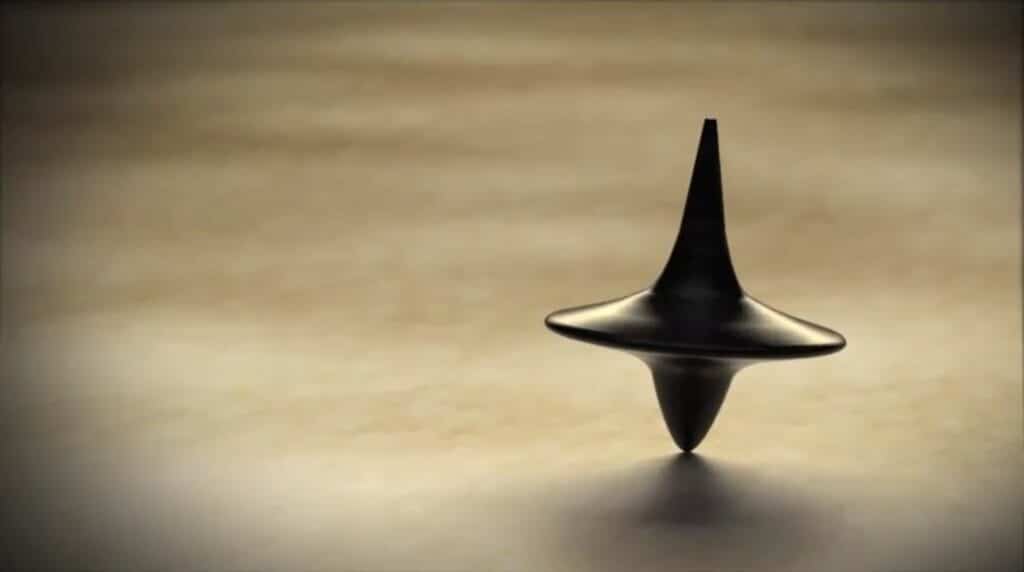
3. What Corners of YouTube Fascinate You the Most?
From its creation in 2005 to this date, YouTube has been a source for many things. From comedic parodies to top streaming music videos, it is a great way to get inspiration in all sorts of ways.
But in order to potentially generate movie ideas, try and hone in on what you’re continually drawn to on YouTube. Is there a particular subject you find yourself drawn to? A particular style? Or a particular character or public figure? Getting lost in YouTube and the internet, in general, can often be an instinctive process. You’re led by your habits, interests and of course, algorithms.
But by taking a step back and looking at these habits objectively you will see the bigger picture. What is it that interests you? What are you drawn to? The great thing about this is the way in which you will already have a wealth of research out there for you.
Say you watch a lot of videos about the mafia. Looking at this objectively, you may find that clearly, this is an area in which you could find a story to tell. And by looking at your viewing history, you will find a ready-made bed of research to start from.
4. Create a Mood Board
Films are visual and your ideas should be too. A mood board is a collection of visual materials that create a certain concept/idea. It is a collage of pictures, cut-outs, drawings, and other visual references.
Having a mood board for your inspiration and thoughts can help you craft your next movie idea.
Sometimes you can find mood boards for existing movies and TV shows, so take a dive and see if you can find something that motivates you. Mood boards are a great way of picturing the kind of movie you want to write. And often images are the best way to piece such a puzzle together.

5. Travel Somewhere New (Even if it’s in Your Hometown)
Getting out of your four walls is a great way to find new stories. Seeing the world and the people around you can give you insight and inspiration not found in your home.
Traveling allows you to see new places, meet new people and get in touch with new cultures. Even if you don’t go far, getting out there will give you a new perspective.
If you can’t travel for a reason, say, a global pandemic, looking at travel and exploring documentaries might do the trick. The purpose is to get out of your routine and daily life and explore the possibilities out there. And it’s not always necessarily about finding characters or stories to tell. Instead, it can be about finding a new perspective on your own life.
One can get used to seeing the same things and existing in the same world. And so getting out of it, however near or far that is, can really help to open up the mind.
6. Pay Attention to Kids
“Only three types of people tell the truth: Kids, the drunk, and the angry.”
― Elizabeth Reyes
If you want honesty, ask a kid. Kids’ innocence allows them to be truthful, playful, and full of inadvertent wisdom. Looking at how children play or react to normal things is a great way to get inspired.
Kids typically also have a highly active imagination, so spending some time around them will allow you to perhaps feel some raw creativity through osmosis.
Moreover, pay attention to what takes and holds kids’ (and teenagers as well) attention, particularly when it comes to movies, books or TV. Often what can grab the attention of a child can grab the attention of anyone. Storytelling is fundamental and kids understand this intuitively.
7. Read the News— Contemporary and Old
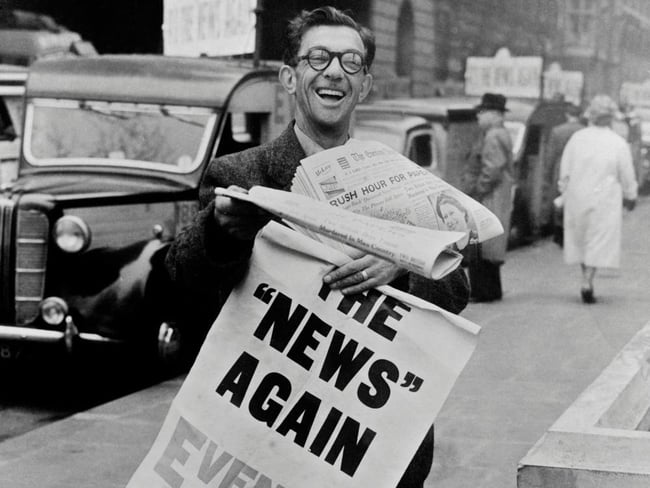
Just like films, the news is a reflection of human reality. As such, within the news, your next movie idea might be found.
Nowadays, we have a lot of resources available to find news. From good old newspapers and television newscasts to a simple tweet or TikTok video. Information about what’s happening around the world is everywhere.
Be selective of what you read/watch, but be open to letting it surprise you. After all, more often than not, reality is stranger than fiction. Try and read outside your usual comfort zone, whether that’s reading news you wouldn’t usually or a specific source that you wouldn’t usually.
In addition, try and look beyond the headlines. There might well be a small story buried on page 20 that could serve as great inspiration, either directly or indirectly. And this is true of both contemporary news and old news. Sometimes it’s the lowkey stories of daily life that can be fleshed out and turned into a great movie idea.
8. Look into the Classics
There is a limited number of ways to tell a story. Although it might be hard to live with this fact, this doesn’t have to be a bad thing.
Most stories have been told before, in all-time classics. So take a look into them and see how you can turn them around. Switching the genre of the classics or the gender of the main character, for example, can easily make a totally new movie.
Furthermore, it’s important to try and analyse what makes these classic stories so continually and universally popular. This is a great way to understand the fundamentals of storytelling. What is it about classic stories that continue to resonate with audiences? And how can you twist or capitalize on this via your own movie ideas?
It’s no secret that there are some basic story elements that continue to resonate throughout time – from Greek Myths to Shakespeare to Game of Thrones. So think about how you can take these classic, foundational elements and apply them to new, exciting and resonant contexts.

9. Turn to History
Many great movie ideas come from the writer wishing to explore a particular moment in history. From ancient Rome in Gladiator to 19th century New York in Gangs of New York. History is obviously vast and therefore a never-ending treasure trove of opportunities for stories.
However, an important way into a historical context is to place or find a character within it. Otherwise, the scope can be overwhelming. The research and amount of information to convey can drown the potential plot. It’s therefore important to always keep the essential narrative arc in mind.
Historical fiction is one of the most popular and engaging movie genres. But as a writer exploring potential stories, you have to find a hook and way into what will be a vast context. It’s ultimately the protagonist‘s story within this historical context that will keep an audience interested.
10. Look at Adapting a Book
Books are always a great fountain of inspiration. Whether it is for improving the craft, finding new references, or just looking for your next movie idea, a book is a great place to check.
Adapting a book is a great way to dip your toes in the screenwriting water without having to worry (too much) about story structure and character development since the original writer already did it for you.
Books become classics because people relate to them and they are efficient in evoking emotions. Not only can you potentially find your next movie idea while reading classics, but you will also learn a lot about storytelling.
Of course, for contemporary books you’ll need the rights before you start adapting. But if you have access to such resources, scouring the wealth of contemporary books (both fiction and non-fiction) is a vital way of generating movie ideas, whether they’re direct adaptations or more loose ones.
You don’t have to limit yourself to fiction either. Non-fiction books have also proven to be a great source for movie ideas. Movies such as Think Like a Man and What to Expect When You’re Expecting are based on non-fiction books, for example.
Take Advantage of the Public Domain
“Public domain” are those creative materials that are not protected by any intellectual property laws. Typically this starts 70 years after the author’s death.
Most literary classics are part of the public domain, which means that you can adapt them without paying for their distribution rights. With this, you can create new content based on or inspired by these books, without worrying about being sued for using them.
William Shakespeare’s works, for example, are all part of the public domain. This is why we constantly see adaptations brought to the big screen. They’re examples of obvious and already well-adapted public domain titles. But there will, of course, be lesser-known ones out there waiting to be adapted for the first time.
11. Swap the Genre of your Favorite Book
As we said before, swapping the genre of an existing movie is a great way to make something new. The same applies to literature.
Think about Psycho, from Robert Bloch. Can you imagine that instead of a thriller, this was a romantic novel? Imagine Norman Bates being a kind, introverted guy trying to conquer the motel’s guests and struggling because they are out of his league.
Swapping genre can be a great way of asserting a cinematic touch to an already told story. It encourages you to think of the tone, style and intention you want to tell the story in. Some stories may seem tailor-made to a particular style or genre. But you’d be surprised at the ways in which small choices can make a big difference in the overall feel and intention of a story.
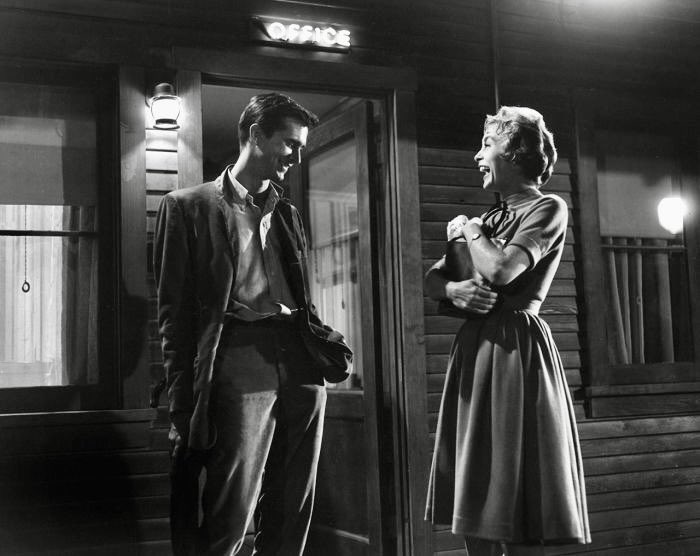
12. Adopt the Villain’s Perspective
They say that history is written by the victors. But what if you were to turn this around? Villains can often provide a more interesting insight into a particular story than the hero can.
Proof of this comes via series such as Disney Channel’s Descendants and the ABC series Once Upon a Time. Both explore the lives of classic fairy tale villains.
Joker, meanwhile, took a classic Batman villain and explored what made such a dark character in the first place. This allowed for the exploration of territory not typically ventured to in superhero movies.
Villains have different motivations, needs, and expectations, and exploring them can bring in ideas and themes that the heroes cannot.
13. Reflect on Your Own Story and/or Identity. What Do You Have to Say?
Experts say “write what you know”. And what do you know more about than yourself?
Although finding your voice as a writer can be tough, using it can be extremely satisfying. Think about the things that move you and what you want to express. Think about your own experiences and what you can say that no one else can.
Some good questions to ask yourself are: how is this relevant to other people? Can others relate to what I want to express? What values commune with my vision? What distinct take do I have on a certain subject matter or experience?
Even if these questions sound heavy and philosophical they’re vital to finding your true voice as a writer. And when you find your true voice, your movie ideas will have much more meaning and resonance. This is a key way of giving your movie ideas distinction amidst a crowded marketplace. With so many other writers out there vying to have their voice heard, what do you have to say that they don’t?
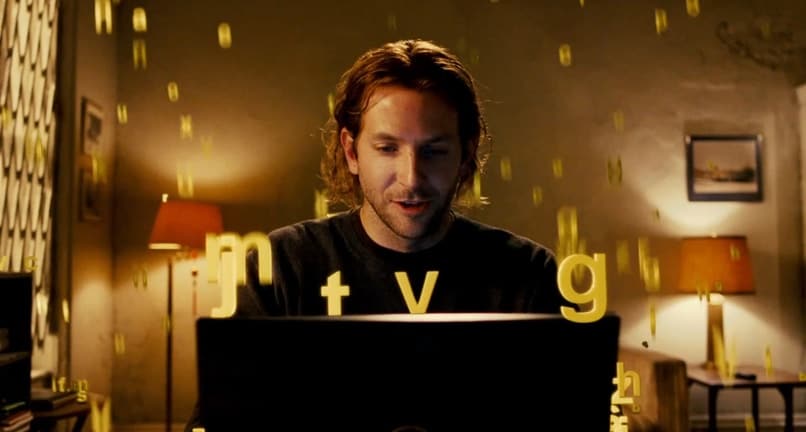
14. What Do You Think is Missing From Cinema as it Stands?
Similarly, what gaps in the world of cinema can you fill with your vision?
Maybe there are values that aren’t quite being explored. Or maybe there is a certain political/scientific issue that has not been addressed in fiction. Perhaps you think a certain style is missing from the cinematic landscape. Sick of franchises or Marvel movies? Well, what are you going to add in their place?
The job of screenwriters and filmmakers is to make cinema better, in one way or another. And this doesn’t have to be held up to a rigid standard of what makes great movies and what doesn’t. Instead, try and get in touch with what you feel you’d like to see more of. This is often the greatest barometer you can use for what to write. What do you want to see?
Whether it’s a particular genre, style, story, character or setting – think about what’s missing from the cinematic landscape and seek to remedy this gap with your own movie ideas.
15. Listen to All Kinds of Music
Music is a great way to find inspiration, for basically anything you need to do. We all have a favorite type of music that we enjoy and makes us feel better. But what if you let yourself listen to other kinds?
Different music creates different vibes and those might be exactly what you need to find your next movie idea. Try and reach outside your usual playlist and your musical comfort zone. Allow music to take you to a particular frame of mind or a particular place.
Furthermore, because film is an audiovisual medium, music can help you visualize your story, allowing you to back engineer it and come up with a plot. Music can help set a tone, take you somewhere or help you get in touch with your emotions. And this can be an important way of unlocking potential movie ideas. Music can help connect the dots between the kernels of an idea and the emotion that comes with it.

16. Interview Someone
Having someone talk about themselves can be a great source of movie ideas. Even a person that appears to have an “ordinary” life can have a story that makes a great film. Knowing someone’s life in detail can give you plenty of inspiration from which ideas can sprout.
Details of people’s experiences can reflect on interesting, unique stories or fundamental universal stories of love, loss and life. Everyone has something to say and listening to people reflect on their experiences can give you an objective insight. This might be focused around a particular subject (such as interviewing war veterans) or be broader (for example, looking at the way people remember relationships or their youth).
There are infinite fascinating people in the world and some might be closer than you think. Take a chance and ask around, you’ll be surprised about who you might meet and the stories you might uncover. Ask questions in a structured, focused way and try and get that person to reflect honestly and openly.
Every life is full of rich detail and experience. And you never know just how much this rich detail can contain the key elements of a great story.
17. Delve into Your Family Tree/Family History
Whether it’s exploring the stories of a particular ancestor or just taking a name for a character, looking into your family history and tree can be great story fodder.
And it can be particularly useful for generating movie ideas when thinking of exploring a particular time period or historical event. This helps you place someone you have an intimate connection with within a larger, resonant context.
This way of generating movie ideas shares many qualities with other methods, such as exploring history or exploring your own identity. However, specifically looking at your own family provides an extra intimacy and resonance. This is especially true of family stories you might not have known previously. Who knows what stories and connections to history you might discover?
By researching your own family history, you’re telling a story that no one else (apart from other members of your family) can. And in coming up with movie ideas, this is one of the most important assets to have.
18. Build up From a Memory

We all have a holiday that we loved or a teacher that really marked us when we were kids. Perhaps that one birthday present or your first time winning a medal. Film is a reflection of our reality, but it can also be a window to our past.
Moreover, by digging into your memories you may well uncover something fundamental about your life or experiences. And this can stem stories, themes, characters and a distinctive overall perspective.
Memories are in general a great source of inspiration. Dig in and see what you can find. Furthermore, play around with the genre, outcome, and the characters involved. Your memory is just the starting point, everything is valid going forward.
19. Inject a Classic Setup with Elements of Fantasy
What if a Rocky Balboa figure had a portal to travel in time and could see his fights before they happened? Would he use this information to train better or would he simply cheat? How would time-traveling affect his physique? Would he still train the son of his all-time rival? Sounds crazy, of course. But…what if?
What if a medieval setting, based on the Wars of the Roses time period, had dragons in it? Sound familiar? This is the essential premise of Game of Thrones. It takes a familiar setting grounded in reality and adds in fantasy elements in order to make something new.
Adding elements of fantasy can radically change the outcome of almost any story. And doing so can not only lead to a fresh and distinctive story but to dynamic, ingenious storytelling. In adding fantasy to a classic setup, you make the best of a grounded, believable setting but let your imagination run wild at the same time. And this can create a highly engaging world, a world which audiences recognize but can also get lost in the fantasy of.
20. Subvert the Conventions of a Specific Genre
Genres come from a set of rules and elements. For example, romantic comedies tend to have happy endings and horror movies tend to kill off most of the characters but the protagonist. But what if they didn’t? What if a romantic comedy had a difficult ending? What if a horror movie didn’t kill all the characters but killed the protagonist instead?
These combinations might not always work based on the way they alter the key storytelling elements of the genre. But challenging the conventions of a specific genre can often create something new altogether.
Rules of storytelling and genre are there to provide a guide for your writing. And there is a good reason for this, as these rules are often key parts of what makes the genre or story work in the first place. However, it’s important to challenge the presumptions and rules of storytelling. This allows for fresh takes and new territory to be explored.
It’s vital to understand what makes the rules of a particular genre work. And once you understand this, you can play with the rules and break them, leading to potentially new outcomes.
21. Think About What You Can Practically Film
This one might only apply to those with more than one hat, particularly writers-directors or writers-producers. However, it’s still a good option particularly for those trying to write their first film.
If you’re planning on filming your script and using your own means, it’s a good idea to think of what’s accessible to you and write accordingly. Even if you’re not directing your own script, thinking about what will make an easily film-able story can help your script get made.
Confining your story to a single location and only a couple of characters will not only make the project more viable but will also challenge your creative writing skills.
A character that is forced to stay in a single space can be quite interesting to watch and evoke all sorts of emotions. From the stress of growing up through kidnapping, like Jack in Room, to Jeff’s wheelchair-bound anxiety in Hitchcock’s Rear Window, having a limitation on setting can inspire a great movie idea. It forces you to get creative with what few elements you have.
Moreover, it stops you from relying on the external and encourages you to instead plunge into the internal. This can be a great way to flesh out character development and achieve more in-depth, nuanced emotional drama.
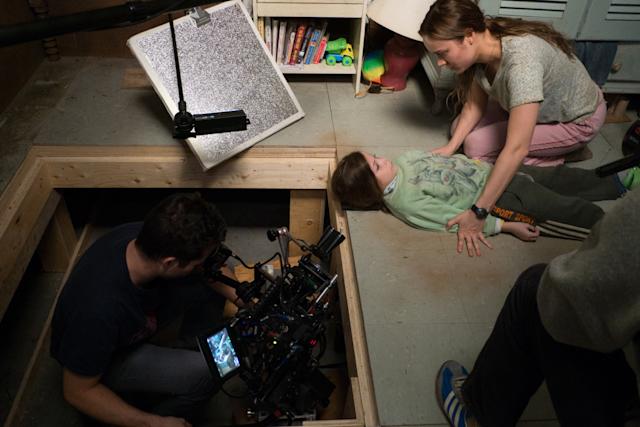
22. List What Resonates With You the Most About your Favorite Movies—Then Combine Them
Chances are, there are certain things in film and media that resonate with you. Consciously or unconsciously, you search for these things when you choose a movie to watch. Think about those things and use them for your own writing.
The things that you like about other stories are great movie ideas already (there’s a reason why you like them). These things might be spread across different movies you like, maybe even different genres. So list everything you can think of and then combine them together.
Some of those ideas might be incompatible with one another, but some might work in a way you don’t expect. Whether they make sense together or not initially, this exercise can be a great way to come up with a unique and distinctive idea. Most importantly perhaps, it’s a great way to figure out exactly what you like in movies and why. This will, in turn, help in clarifying what story you want to tell and why.
23. Start With an Image
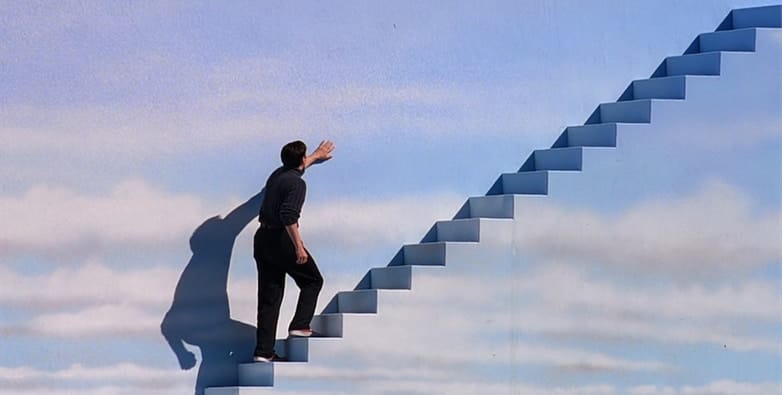
Is there a particular image you can’t get out of your head? Is there a photograph that you can’t stop staring at?
Imagery is one of the most powerful ways to kickstart the imagination, particularly when it comes to screenwriting. Use images that inspire you and try and build a story around this image. An image is just a moment in time, after all. So what came before and after this image?
What is the story of the character in it? What is the world and context that exists outside this single frame?
Furthermore, paintings are also powerful forms of imagery that can serve as great inspiration. The lesser-known about the painting the better. Who is the subject? Who are the background characters? Why did this painter paint this particular picture?
Imagery is obviously at the heart of cinema. So stemming movie ideas from a single image can be a fantastic way to build a striking cinematic vision overall.
24. Listen to Other Artists
The world is already filled with inspiration if you pay attention. Surround yourself with other creative people, attend different events, go to galleries. Overall, open up your eyes and you’ll see that movie ideas are everywhere.
Moreover, by listening to how other artists come up with their own ideas, you can find the route to your own. This can come in the form of listening to interviews, for example. But it also comes by truly engaging with other artists’ work. They might be other screenwriters or painters, photographers, architects or designers. Whatever the form, it’s important to engage with how art is created in general.
It can sometimes be tempting to see your own work in isolation. Writing can be a lonely process after all. But by connecting yourself to an artistic community, either literally or figuratively, you expand your mind and scope. As a creative, you’re part of an ecosystem. Connecting yourself to that ecosystem and allowing yourself to be inspired is an important way of opening up the scope of your own work.
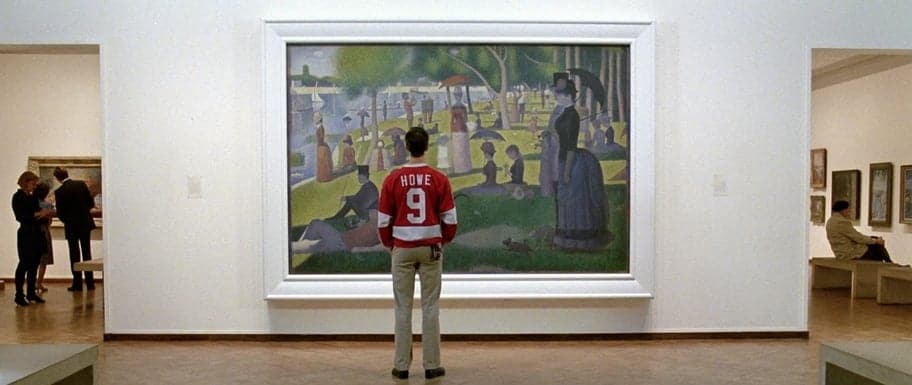
25. Start at the End
Reverse engineering can help you work many things out. Like a detective figuring out how the killer committed the murder, you can come up with your whole plot while starting from the end.
Is there a particular dramatic conclusion that speaks to you? Do you know how you want to end your story but don’t know how to start it? By finding a powerful ending and putting the pieces together to get there, you can start to form a story.
Movies like Pulp Fiction, Saving Private Ryan, Forrest Gump actually start with the ending and build the story from there. Your story doesn’t have to start like this, but thinking about the ending first can help you craft the plot.
It’s important that this process is structured, as doing it loosely can lead to the ending feeling contrived. So plan it like you would plan the building of a house. You know what the end product will look like. But how are you going to build to get there? This can be a great way of writing a story with focus.
Sometimes trying to follow a story through from the beginning to the ending can feel exhaustive and lead to distraction. But start from the end and work backwards and you give your creative process an alternatively structured approach.
–What did you think of this article? Share It, Like It, give it a rating, and let us know your thoughts in the comments box further down…
– Struggling with a script or book? Story analysis is what we do, all day, every day… check out our range of script coverage services for writers & filmmakers.
This article was written by Regine Clemenceau and edited by IS staff.
Get *ALL* our FREE Resources
Tackle the trickiest areas of screenwriting with our exclusive eBooks. Get all our FREE resources when you join 60,000 filmmakers on our mailing list!

